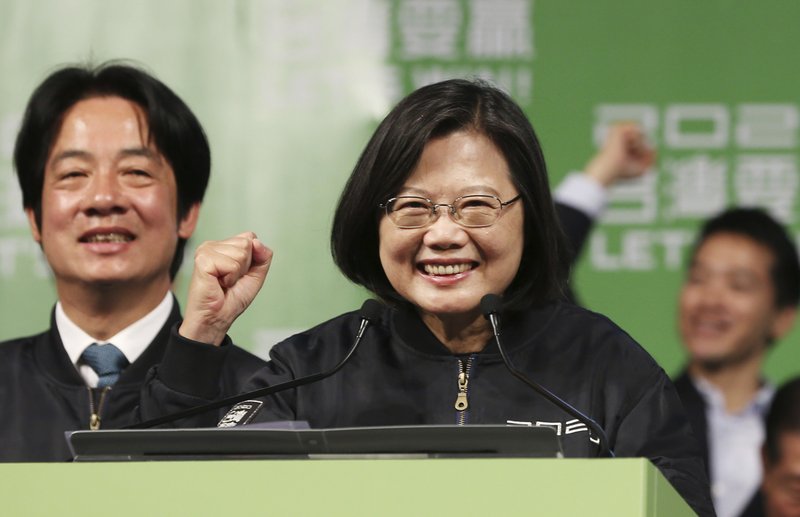TAIPEI, Taiwan -- After a landslide reelection victory, Taiwanese President Tsai Ing-wen met Sunday with the top U.S. representative for Taipei, as China warned that countries should stick with recognizing Beijing as the rightful government of "one China," including Taiwan.
William Brent Christensen, a U.S. diplomat who is director of the American Institute in Taiwan, congratulated Tsai on her victory in Saturday's election, and she thanked him for his support.
China considers the self-governed Taiwan to be a part of its territory and opposes any official Taiwanese contact with the U.S., seeing it as interference in China's domestic affairs. The U.S. does not have formal diplomatic relations with Taiwan but is legally bound to ensure that the island can defend itself against threats.
Tsai has sought closer relations with the U.S. while pushing back against pressure from China, and President Donald Trump's administration has reciprocated.
After election results were announced late Saturday, Ma Xiaoguang, a spokesman for China's Taiwan Affairs Office, said China is willing to work with the Taiwanese people to advance the "peaceful reunification of the country."
But he cautioned that China would firmly protect its territorial integrity and said it opposes any separatist moves and independence for Taiwan, according to China's official Xinhua News Agency.
[Video not showing up above? Click here to watch » https://www.youtube.com/watch?v=9GCgBmQiaUk]
Tsai has said that Beijing might increase its pressure on Taiwan after her victory. China cut off formal ties with her government over the past two years, restricted visits by Chinese tourists and sought to further isolate Taipei by luring away some of its few diplomatic allies, which now number only 15. Chinese military exercises across the Taiwan Strait and air patrols around the island have added to tensions.
But Tsai received resounding support for her rejection of China's suggestion for a "one country, two systems" approach to governing Taiwan. Months of anti-government protests in Hong Kong, a semi-autonomous Chinese territory, have convinced many in Taiwan that such a plan is unworkable.
With the election behind her, Tsai now faces the challenges of keeping economic growth on track and delivering on promises to improve the lives of Taiwan's people.
"It's important to enable younger people to make a better living -- this is what we expect," said Lin Li-li, who with her husband, Wang Wen-long, was preparing to return home after they visited Taipei to vote.
The focus now, said Wang, is "to have a more harmonious society and enhance our living."
Also on Sunday, more than a dozen dissidents who traveled to Taiwan to observe the island's presidential election, many of them exiled from communist-ruled mainland China, said at a forum in Taipei that Tsai's reelection has important implications for relations among China, the U.S. and Taiwan, as well as for Chinese everywhere.
At a time when the government of China has tightened surveillance and controls, underground groups and protests persist, the dissidents said.
[Gallery not loading above? Click here for more photos » arkansasonline.com/113taiwan/]
Taiwan's election results are the clearest indication that there is still hope for democracy in China, said Wang Min, leader of the U.S. branch of the outlawed China Democracy Party.
Taiwan's democracy "shows the mainland Chinese a path for the future," Wang said. "The light is always shining before us."
Shao Jiang, a former student leader in the 1989 Tiananmen Square pro-democracy movement that ended with a violent military crackdown that killed hundreds, possibly thousands, of demonstrators, said the strong backing for Tsai, who has adopted a tough stance toward Beijing, shows great confidence by the Taiwanese in their democracy.
"This is a very clear message to the Chinese authorities, which is that the Taiwanese people want their own right to decide," Shao said.
There's hope that the democratic values that have taken hold in Taiwan could be shared in Asia, said Teng Biao, a Chinese legal scholar and human-rights activist who now lives in the U.S.
"I hope to bring Taiwan's democracy back to China," Teng said.
Information for this article was contributed by Johnson Lai and Emily Wang of The Associated Press.
A Section on 01/13/2020
